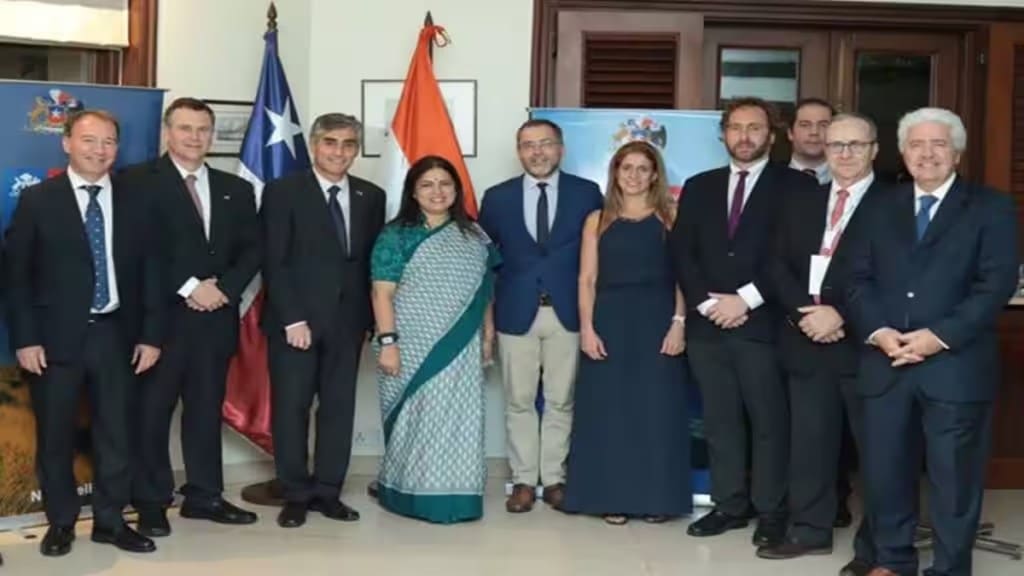India and Chile are set to have discussions for the second expansion of their existing Preferential Trade Agreement (PTA), with the potential addition of new chapters.
A top diplomat told Financial Express Online that during the anticipated visit of Vice Minister of International Economic Affairs, Claudia Sanhueza, the Chilean delegation is expected to introduce services, with a particular focus on the digital sector, and investments into the negotiation framework.
While the official announcement of the visit is yet to be made, next week the Vice Minister is slated to convene with India’s Ministry of Commerce and Industry representative, Piyush Goyal, for a comprehensive dialogue regarding the expansion of the PTA and the prospective incorporation of fresh chapters.
This meeting follows earlier interactions this year when Chilean envoy Juan Angulo provided insights into the ongoing negotiations for the PTA’s second expansion. He underscored the complementary nature of their markets and emphasized that this expansion is a complex endeavour necessitating input from various stakeholders.
Currently, the two nations are in the midst of their third round of negotiations, aiming to enhance the existing PTA that initially underwent expansion in 2017. It is noteworthy that Chile holds the distinction of being the first Latin American country to individually establish a Trade Agreement with India. Additionally, both countries maintain a Partial Scope Agreement with India, which came into effect in August 2017, further cementing their economic ties. Moreover, various other commercial agreements, such as the Memorandum of Understanding for the acquisition of pharmaceutical products in 2021 and the 2020 agreement to eliminate Double Taxation, further solidify their economic partnership.
The signing of the PTA in 2006 marked a turning point in bilateral economic relations, fostering trust between India and Chile despite geographical separation. In 2017, this PTA underwent an extension, enabling new concessions and further cooperation. Chile offers its trade partners the advantages of political stability, a robust rule of law, a business-friendly environment, and access to emerging markets, underpinning the foundation of trust in this relationship.
As Ambassador Angulo stated, “For these reasons, negotiations have been ongoing to expand the existing PTA, and we have recently signed agreements to avoid double taxation and to enhance cooperation in agriculture. These agreements will contribute to the deepening of cooperation between our nations.” The Memorandum of Understanding in agriculture not only facilitates increased exports of agricultural products from Chile to India but also fosters collaboration with local industries, enabling the exchange of expertise and technologies.
The two countries are currently negotiating to expand their collaboration into various sectors, including disaster management, disability-related policies, information technology and communication, police cooperation, regulatory bodies in the pharmaceutical sector, and social security. This extensive scope demonstrates their commitment to strengthening their partnership across diverse domains.
One notable area of potential synergy lies in Chile’s prominence as a global leader in lithium reserves, the second-largest producer globally. This positions Chile advantageously for future developments in the renewable energy sector. On the other hand, India has established itself as a leader in technological advancements in non-conventional renewable energy sources, including wind turbines, solar panels, and electric vehicles. These converging strengths provide fertile ground for meaningful collaboration in green technologies.
While there have been preliminary discussions recognizing the mutual benefits and industrial complementarity, both nations acknowledge the importance of continued dialogue to determine the most strategic way forward. In October 2019, India dispatched a mission to Chile, where representatives from the Ministry of Mines, NITI Aayog, and KABIL met with officials from the Ministry of Mines and CORFO in Santiago. They also visited production sites in the northern region of Chile, further illustrating the commitment of both countries to nurturing their bilateral relations.
